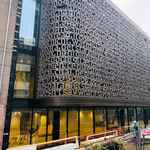Vossius Seminar
The Political Agency of Sound: Colonial and Anticolonial Sound Archives in the Shaping of the Humanities
- Date
- 25 April 2022
- Time
- 16:00 -18:00
- Location
- University Library
- Room
- Doelenzaal
The session covers two individually conceived presentations that both touch on practices of sound archiving and curation as colonial, anti-colonial and postcolonial endeavours. The papers, given by Barbara Titus and Rui Vilela, cover divergent locations (Indonesia and Guinea-Bissau) in overlapping eras (the mid-twentieth century) when political decolonisation in many parts of the world also profoundly affected humanities scholarship. With a specific focus on sound and listening, both papers aim to probe what we do today – as scholars, artists, curators and cultural diplomats – with the sonic, visual and textual archived legacies that remain foundational to current scholarly practices, methods and approaches. The session will be rounded off by a commentary from Remco Raben.
Barbara Titus (Associate Professor of Cultural Musicology, UvA)
Sounding Out the Jaap Kunst Collection
With the Jaap Kunst Collection, the University of Amsterdam houses one of the foundational ethnomusicological collections of the world. Jaap Kunst (1891-1960) recorded a wealth of Indonesian musics between 1919 and 1934. In the 1950s, he also coined the notion of an “ethno-musicology” that was adopted in the entire Anglophone academic world as a articulated and established scholarly discipline. The Collection – more than 300 sound items (digitised wax cylinders), ca. 10,000 letters (40,000 pages) of (scholarly) correspondence, photographs of numerous music, dance and theatre practices, music transcriptions and publication manuscripts – reflects the “salvage ethnology” that featured early ethnomusicological practice: capture the music before it gets extinct. In Kunst’s time, his approach interrogated the supremacist aesthetic values of comparative musicology that qualified European music as the unquestioned pinnacle of human civilisation. At the same time, his methods of recording and archiving vindicated the societal organisation of the Dutch East Indies colonial empire in his notion of an abstracted static and discrete “ethnos”, assuming strict separations between recordist and recorded.
Thus, we can regard his Collection as an emblematic colonial sound archive that shows the complexities of colonial relationships. In this paper I propose to listen to, rather than read, these colonial relationships, not only in Kunst’s archived sound material, but also between the lines of his written publications. I do this by elaborating on a research project that I coordinate with meLê yamomo, entitled Decolonizing Southeast Asian Sound Archives (DeCoSEAS). This project aims to explore the critical and hermeneutic agency of listening – to archived voices, to multiple voices at once, and to those voices that did not make it into historiographies, often written in colonial languages by a colonial elite.
Rui Vilela (PhD student at ASCA, UvA, Vossius Fellow Spring 2021)
Bissau Resending: The Western Humanist Listens
In 1950, Aimé Césaire excoriated the western humanist in a pivotal essay of anticolonial literature: Discourse on Colonialism. Three decades later, Edward Said examines the historical transfer of theories and ideas in Travelling Theory: an originally liberating theory degrades from involved militancy to politically committed scholarship, and loses immediate force. Between these essays' publishing dates, the independence struggles against European colonial rule led to the decolonisation of Africa. In Guinea-Bissau, the Liberation Movement (1963-1974) was led by the African Party for the Independence of Guinea and Cape Verde. Its broadcaster – Rádio Libertação – bequeathed a sound archive constituted amidst processes of nation building, against the backdrop of a profound social, political, and economic restructuring. In the manner of Said's borrowed theories, anticolonial texts as those by Amílcar Cabral, the party's general secretary and leader of the Liberation Movement, have been read as foundational to postcolonial studies and decoloniality. In this sense, it can be said that theories and practices that came to constitute the anticolonial archive laid the groundwork for radical changes in western humanities. Yet, Césaire forecasts Europe's last attempt to prevent its own demise by taking up the role of cultural and political galvaniser at its fringes. Re-reading these essays today complicates ongoing decolonial endeavours or, in Said's words, when travelling theories gain a status of authority, they can betray critical consciousness. The Bissau-Guinean sound archive points to networked broadcasting practices and listening routines as political enterprises and, thus, it contrasts with centralising northern histories of sound archiving. Although a lettered listening heeds to the contending forces capable of decolonising western humanities, the anticolonial sound archive remains chiefly a profuse source of sonic agency.
Remco Raben (Professor by special appointment, UvA; Associate professor Utrecht University)
Commentary
